
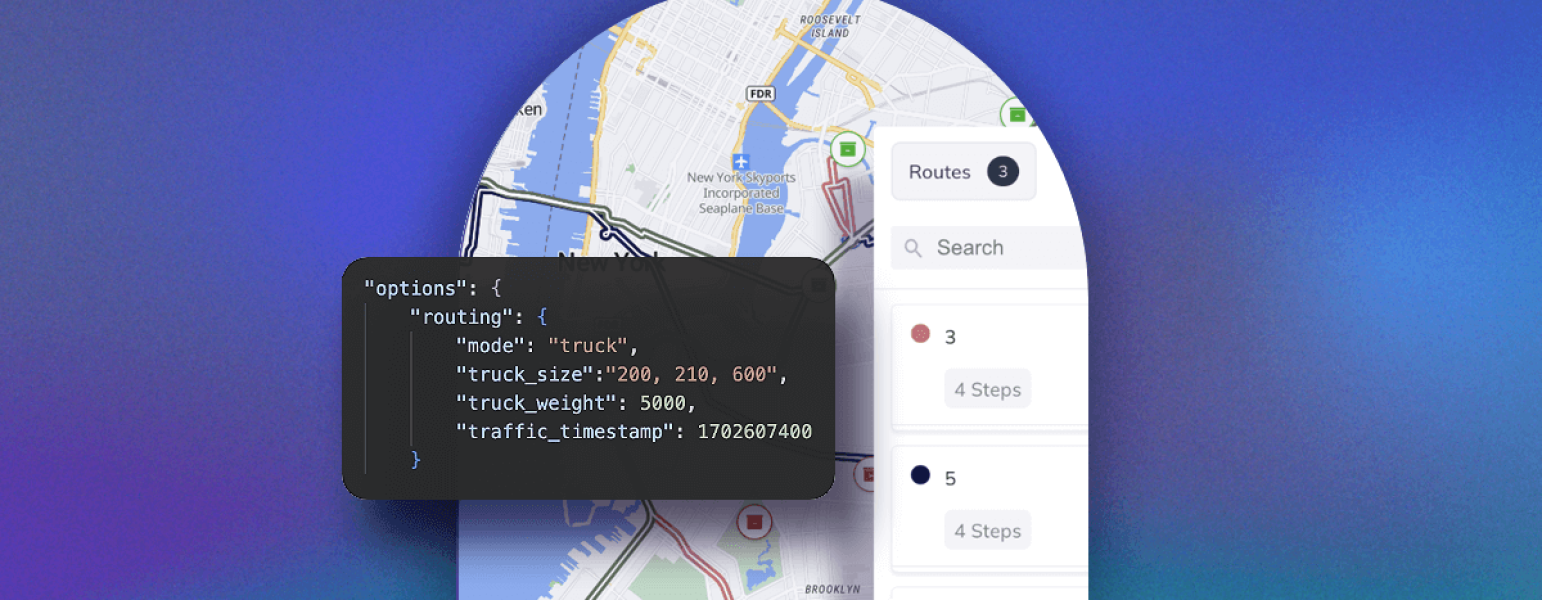
- BLOG
Top 10 Route Optimization APIs for 2025: Boost Business Efficiency
Published: March 28, 2024 | Updated: August 17, 2025
Route Optimization API
Optimize routing, task allocation and dispatch
Distance Matrix API
Calculate accurate ETAs, distances and directions
Directions API
Compute routes between two locations
Driver Assignment API
Assign the best driver for every order
Routing & Dispatch App
Plan optimized routes with 50+ Constraints
Product Demos
See NextBillion.ai APIs & SDKs In action
AI Route Optimization
Learns from Your Fleet’s Past Performance
Platform Overview
Learn about how Nextbillion.ai's platform is designed
Road Editor App
Private Routing Preferences For Custom Routing
On-Premise Deployments
Take Full Control of Your Maps and Routing
Table of Contents

Are you looking for the best route optimization API to streamline your business operations in 2025? With numerous options available, finding the right one can be daunting. This guide simplifies your search by presenting the top 10 route optimization APIs, each evaluated for performance, features, and pricing.
With the wide selection of route optimization APIs currently available in the market, there’s no excuse for inefficient, poorly planned business operations in 2025. Be it for delivery companies, logistics management, field service operations or ride hailing services, choosing the right route optimization API can make all the difference.
Although specific requirements may vary from one organization to the next, there are a few essential features and qualities that should be non negotiable in your search for the right API, no matter what kind of operation you’re running. Here are five must-have attributes to look out for when selecting a route optimization API in 2025:
Among the most critical functions of any routing solution is the ability to provide accurate directions and real-time route updates. In the modern cut-throat business environment, you’re all but guaranteed to fall behind your competitors without access to streams of up-to-the-minute information to adjust routes dynamically based on traffic conditions, weather events and unexpected road closures. When evaluating route optimization APIs, prioritize those that offer robust real-time data integration, including traffic updates, road closures and weather forecasts. It would also be prudent to assess how effective the API’s routing algorithms are.
Meeting your current routing needs is just half the problem. As your business grows and evolves, it’s only natural that your route optimization needs may change with time. This is why it’s important to select an API that can scale with your organization to accommodate future expansion. It’s a good idea to find a solution that offers deep customization to adapt to changing needs as well; the routing parameters you have in place to enhance operations today might end up becoming obstructions tomorrow. Look for low-latency solutions that can keep up with large-scale operations. Performance is not the only dimension to consider with regard to scale, though. Pricing matters, too. You want a solution that remains affordable as your operation grows, and flexible pricing plans are the best way to ensure that.
Downtime can be quite costly — not just in monetary terms but also in terms of customer sentiment and brand reputation. Before you place your trust in a solution provider, spend some time assessing their track record of reliability and looking into their SLAs and uptime guarantees. Do some research on the provider’s reputation within the industry. Check reviews and testimonials to gauge their reliability and customer satisfaction levels over time. Narrow your shortlist to APIs that guarantee high availability and have redundancy measures in place to minimize the risk of service interruptions.
With the increasing importance of data privacy and security, businesses must prioritize APIs that adhere to stringent data protection standards. When evaluating route optimization providers, inquire about their data security measures, including encryption protocols, access controls and compliance certifications. Make sure that they comply with relevant regulations such as GDPR and CCPA, depending on your geographic location and industry. Protecting sensitive customer data should be a top priority when selecting a route optimization API in 2025.
Finally, consider the ease of integration and developer support of the route optimization API provider. Choose a provider that offers adequate technical documentation, SDKs and developer tools to facilitate seamless integration into your existing systems and workflows. Don’t forget to assess the level of technical support provided, including response times for inquiries and the availability of dedicated account managers or support teams. A provider that prioritizes developer experience and offers robust support can significantly enhance the success of your route optimization implementation.5
Simply put, efficiency is crucial to keeping your business competitive. Pushed far enough, it could even become the key to success. For businesses that involve the movement of people or goods with multi-stop routes, route optimization APIs are what drive that efficiency. They improve productivity, reduce costs, minimize emissions, enhance customer satisfaction and enable scale and operational flexibility, all while making sure that your unique operational requirements are met as efficiently as possible without transgressing any rules or regulations. Route optimization APIs do a lot of heavy lifting!
Here’s a list of businesses that use route optimization API:
We evaluated each route optimization API based on a comprehensive set of criteria to ensure a thorough analysis.
All information was gathered from publicly available sources. Without further ado, let’s get into it.
The best Route Optimization APIs for Businesses are:
Mid-sized and large enterprises for last-mile, middle-mile and field service use cases; govt. use cases
4.7/5
NextBillion.ai’s Route Optimization API brings together a powerful mix of performance, flexibility, scalability and cost effectiveness. With features like multiple vehicle routing profiles, customizable objective functions and over 50 routing constraints, you can generate optimized routes that satisfy your unique operational needs. Account for factors like truck dimensions and weight, cargo type and volume, driver preferences, shift timings, delivery windows and much more to ensure efficient and regulation-compliant routes for your vehicle fleet. Our support team has received much customer praise for being prompt, proactive and thorough at every step, from testing and integration to production and beyond. NextBillion.ai’s APIs are cloud agnostic and can be easily integrated into your tech stack with just a few lines of code. Learn how to solve route optimization problems with easy-to-follow API Tutorials.
Watch a short video demo to learn how to use the API.
NextBillion.ai offers flexible pricing plans, so you have the freedom to choose what works best for your business. The pricing models can be based on the number of assets, tasks or API calls. We analyze your specific use case and customize costs accordingly to ensure that you only pay for what you need and that your costs remain predictable. NextBillion.ai’s cost-effective rates enable you to scale your operations without worrying about excessive API expenses.
✅ Advanced Truck Routing Support: The API is exceptional in its truck routing capabilities. It enables organizations to create routes that are compliant with different truck types, taking into account factors such as weight, dimensions, and cargo specifications.
✅ Flexible Pricing: NextBillion.ai provides a pricing model that is adaptable to the unique requirements and budgets of businesses.
✅ Telematics Integration: The API seamlessly integrates with telematics systems, enabling businesses to utilize real-time vehicle data for dynamic route optimization.
❌ Geocoding Restrictions: The API is unable to directly geocode addresses.
❌ Limited Driving Modes: The starter plan only offers car and truck driving modes.

Small- to mid-sized last-mile delivery businesses that operate at low or moderate scale.
4.6/5
Google, being the global behemoth that it is, has excellent data quality for virtually every region across the world, enabling accurate ETAs and live traffic updates. Nonetheless, Google Route Optimization API is unsuitable for large-scale enterprises for several reasons. Its routes are often suboptimal, taking over 50% more time and/or distance compared to higher-performing alternatives like NextBillion.ai’s Route Optimization API. It also omits core logistics features like truck routing profiles, complex task sequencing, custom objective functions and depot designation. This means that Google Route Optimization API is geared towards only last-mile operations while ignoring the first and middle mile. The platform does offer some customizations but is quite limited in the constraints and preferences you can set. It also has a poor reputation for the level of support customers receive.
Google Route Optimization API follows a fixed pricing model. They charge $0.03 per shipment per optimization, where ‘shipment’ is defined as a combination of location identifiers and load identifiers. The cost remains unchanged regardless of how many shipments or API calls are required. Such an inflexible pricing structure makes it impossible to scale operations without significantly driving up API costs — yet another reason it’s best suited to smaller businesses operating at relatively modest scales.
✅ Accurate ETAs and Live Traffic Updates: Utilizes extensive global data for precise ETAs and real-time traffic updates, ideal for last-mile delivery.
✅ Predictive and Real-Time Traffic Information: Offers dynamic route re-optimization based on predictive and real-time traffic data.
✅ What-if Scenario Analysis: Includes features for planning and anticipating various routing scenarios.
❌ Suboptimal for Large-Scale Operations: Routes are less efficient for large enterprises, often taking more time and distance compared to alternatives like NextBillion.ai.
❌ Lacks Core Logistics Features: Missing key features like truck routing profiles, complex task sequencing, custom objective functions, and depot designation.
❌ Limited Customization and Poor Support: Customization options are restricted, and customer support is reputed to be inadequate.
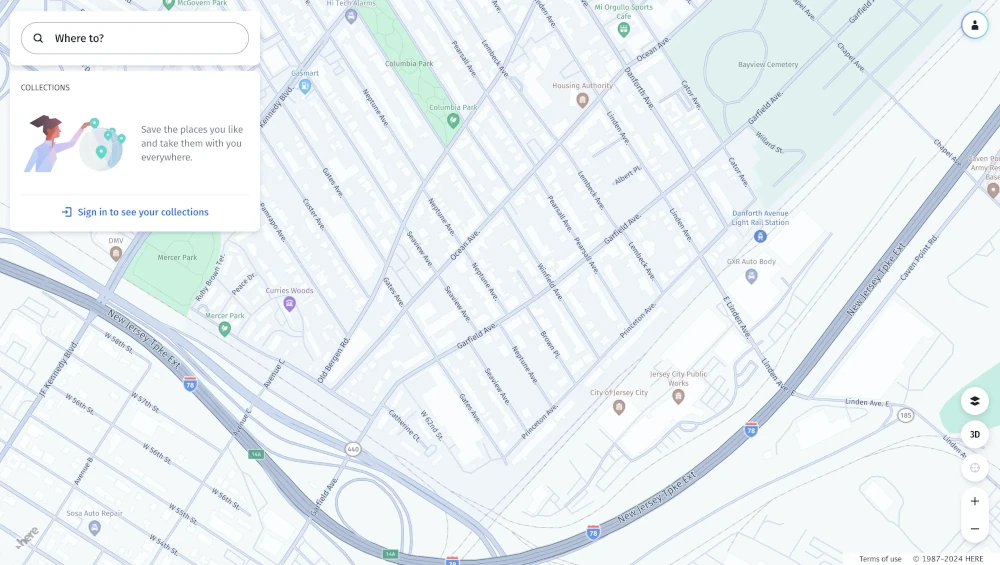
Automotive, logistics, media, telecoms, public sector, retail and insurance use cases
4/5
HERE Technologies is known for its high-quality geolocation capabilities, routing accuracy, live traffic data and ease of use. Developers also rate the platform highly for how quick and simple it is to integrate and implement it into their tech stacks. HERE Technologies does have a few shortcomings, though. It’s relatively inflexible and cannot be tailored to your unique workflows and preferences. For example, you have no option to specify user-defined travel costs for your vehicles. Their customer support is often less responsive than you might hope. While HERE Technologies does have multiple truck routing profiles, these are not applicable to routes longer than 120 miles. If your truck route extends beyond that limit, you will be forced to use generic truck specifications for your routes. The complexity of their pricing model also makes forecasting costs at scale a challenge.
HERE Technologies does offer a Limited Plan, which includes 1,000 free location services requests a day, but this does not apply to their routing solutions — the Matrix Routing and Tour Planning APIs. To make use of their routing capabilities, you’ll have to pay for the Base Plan, which works on a transaction-based model similar to credit systems. The Tour Planning API, which executes fleet route optimization, is free of charge for the first 500 transactions of each month. For 501 to 40,000 monthly transactions, it would set you back $33 per 1,000 transactions. From 40,001 to 200,000 monthly transactions, that becomes $26.40 per 1,000 transactions. Beyond that, you’ll have to contact HERE Technologies directly for pricing information.
✅ Advanced Geolocation and Routing: Recognized for its precise geolocation capabilities and routing accuracy.
✅ Integration Ease: Developers find it straightforward and efficient to integrate into technology stacks.
✅ Real-Time Updates: Offers dynamic route adjustments and live traffic data.
❌ Limited Customization: Unwilling to accommodate custom workflows and preferences, such as user-defined travel costs.
❌ Truck Routing Restrictions: Routes exceeding 120 miles are not eligible for truck profiles.
❌ Complex Pricing Model: The intricate transaction-based pricing makes it challenging to forecast costs at scale.
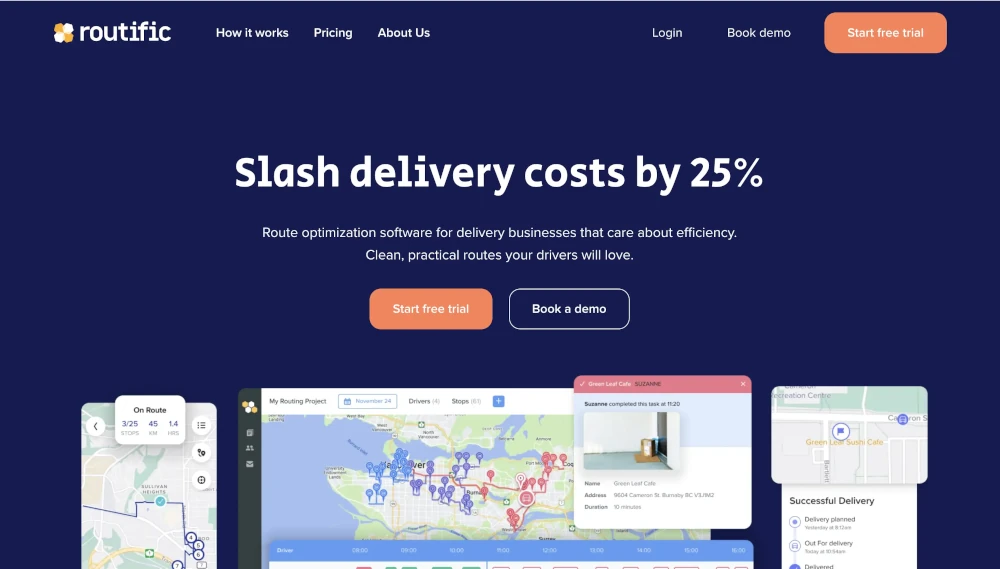
Small- to medium-sized local delivery businesses with multiple drivers and routes
4.7/5
With over a decade of development behind its route optimization algorithm, Routific is a well-respected player in the market. Customers appreciate the platform for its routing efficiency, how easy it is to understand and use, as well as its automated notifications and extensive reporting features. The absence of truck routing and real-time traffic data are big misses, though, and there are user mentions of occasional technical glitches and bugs. The lack of 24×7 availability of support for non-enterprise customers can also be a sticking point for some.
Routific’s basic pricing starts at $49 per vehicle per month. If you want to make use of the platform’s GPS tracking and proof-of-delivery features, that jumps to $69 per vehicle per month. Automated customer notifications via email or SMS and real-time delivery tracking will further push the cost up to $93 per vehicle per month. Alternatively, Routific also offers a per-stop pricing model.
✅ Efficient Routing Algorithm: Highly regarded for its ease of use and routing efficiency.
✅ Comprehensive Reporting: Provides comprehensive analytics to track delivery performance.
✅ User-Friendly Interface: Facilitates route management through drag-and-drop capabilities.
❌ Missing Truck Routing: The absence of support for truck-specific routes restricts the functionality of the system for businesses that run larger delivery vehicles.
❌ Lack of Real-Time Traffic Data: Does not include live traffic information, which may impact the accuracy of the route.
❌ Limited Support Availability: The absence of 24/7 support may prove to be a challenge for non-enterprise customers.
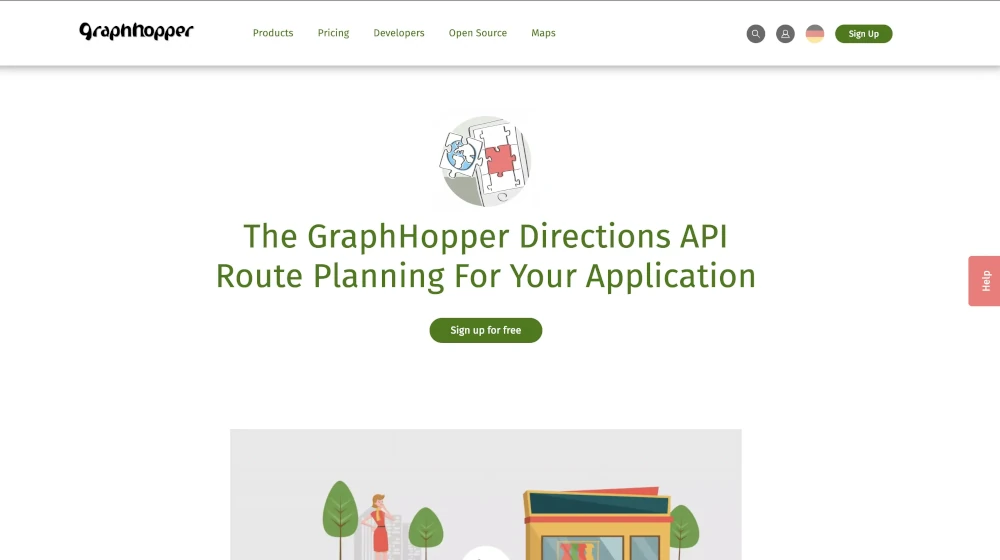
Logistics and navigation for automotive, tourism and food delivery use cases.
NA
GraphHopper is a routing API provider that does not have any end-user application of their own, but you can use their APIs to create your own branded applications with route planning, navigation and traffic-aware route optimization capabilities. GraphHopper’s routing performance is generally quite competent and, much like NextBillion.ai, their platform is based on OpenStreetMap data, so they have good global coverage when it comes to high-quality location data. Customers have remarked, though, that GraphHopper’s reverse geocoding feature is not as straightforward as it could be.
GraphHopper has implemented a credit system to measure API usage, where calls of each API would cost you a certain number of credits depending on which API and the parameters of each request. Their Free tier lets you use 500 credits a day with up to 5 locations and just one vehicle per request. However, this free package is only available for non-commercial use. The Basic, Standard and Premium tiers cost $56, $160 and $384 respectively, with restrictions going from 5,000 to 50,000 credits per day, 30 to 200 locations per request and 2 to 20 vehicles per request. GraphHopper also offers a Custom plan for larger-scale requirements. If you explicitly state in your user application that it’s powered by GraphHopper, you can avail a 20% attribution discount on pricing.
✅ Global Data Coverage: GraphHopper offers extensive global coverage using high-quality OpenStreetMap data, making it suitable for diverse geographical regions.
✅ Versatile Vehicle Routing: The platform supports a wide range of vehicle types, from scooters to trucks, with customizable routing profiles and multiple objective functions.
✅ Detailed Road Data: Includes comprehensive data on elevation, road class, and surface type, enhancing route accuracy and suitability for various use cases.
❌ Complex Reverse Geocoding: Users have noted that the reverse geocoding feature is not as straightforward or user-friendly as it could be.
❌ Limited Free Tier for Commercial Use: The free tier is only available for non-commercial use, which limits its utility for businesses looking to test the platform before committing.
❌ Credit-Based Pricing: The credit system for API usage can be complex and may lead to unpredictable costs depending on the specific requirements and usage patterns.
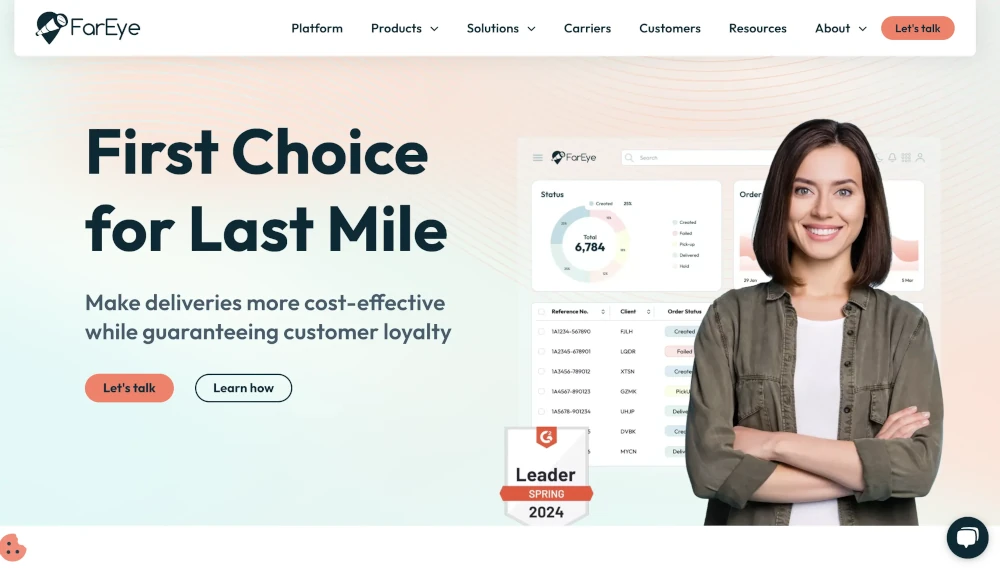
Medium, large and enterprise businesses in delivery, retail, logistics and manufacturing
4.6/5
With over 150 customers across 30 countries, FarEye is a trusted provider of last-mile delivery optimization and visibility solutions. Their real-time notifications and tracking capabilities are widely praised by customers for enabling close oversight of delivery operations. FarEye is known to have a great customer support team that is speedy, proactive and easy to work with, and the platform is customizable to each client’s needs. Customers particularly appreciate the ability to add comments when closing alerts so that they can provide additional context when necessary. Downsides to FarEye’s platform include the occasional generation of false deviation alerts and numerous complex features that require hands-on training and practice to use effectively.
Pricing information is not publicly available; please reach out to FarEye for quotes.
✅ The mobile application is commended for its ease of use in closing alerts and mapping devices, as well as the GPS pings that keep users informed about their location and trip details.
✅ Users appreciate the simplicity of generating reports, receiving and dispatching shipments, and tracking orders.
❌ The absence of a single closure option is inconvenient for certain users, as it restricts the flexibility of managing alerts efficiently.
❌ Users occasionally report errors, including difficulties assigning shipments to last-mile riders, bagging problems in the mid-mile, and bulk pickup issues.
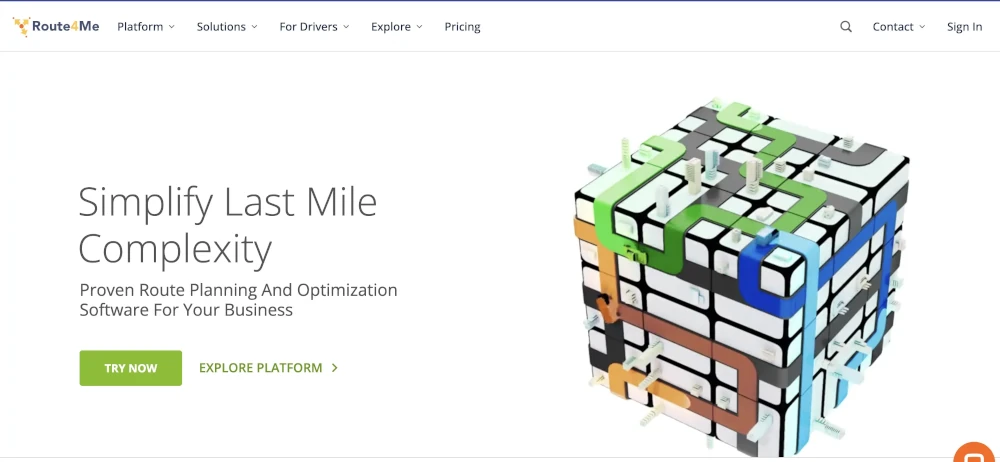
Field services, field sales, field marketing and field merchandising
4.6/5
Founded in 2009, Route4Me has built a healthy ecosystem of optional features and capabilities around its route optimization solution over the years. The algorithm is proficient at shortening routes, but the solution has serious drawbacks, too. Route4Me only optimizes routes to minimize the number of vehicles used, and this can’t be changed; you cannot set it to minimize distance or cost. Obviously, this is far from ideal. It’s also worth noting that Route4Me regularly underestimates ETAs by up to 50%. Journeys that took 20 minutes to complete in real time were frequently predicted to take 10 minutes or less. Such disparities could have disastrous effects on business outcomes and customer sentiment.
There are three plans available — Route Management, Route Optimization and Business Optimization. It should be noted here that the Route Management package does not offer any route optimization features, so that’s not going to serve your purpose. The plans start at $40, $60 and $90 per user per month respectively, but there’s a minimum commitment of 5 users, so at the very least, the plans would cost you $200, $300 and $450 per month. Route4Me has numerous optional add-on features like curbside routing, driver skills and text message notifications, each of which would further add to your costs if you choose to implement them.
✅ Comprehensive Features: Provides a diverse array of capabilities, such as dynamic reoptimization, geocoding, and geofencing.
✅ Advanced Analytics: Offers comprehensive reporting and analytics to track the performance of the route.
❌ Optimization Focus: The only option is to optimize routes to reduce the number of vehicles, with no option to prioritize cost or distance.
❌ Inaccurate ETAs: Frequently underestimates ETAs, which can result in customer dissatisfaction and potential operational issues.
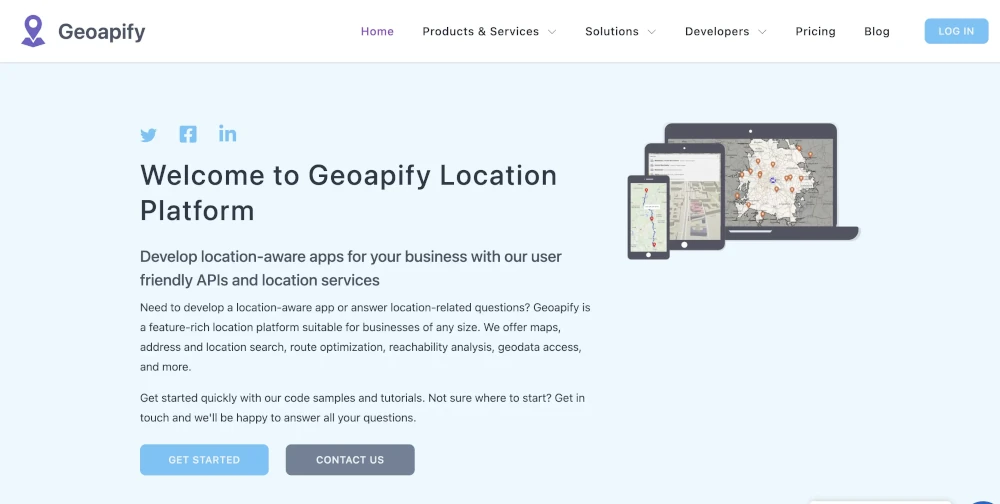
Startups looking for substantial free tiers, as well as small- and medium-sized businesses
4.8/5
Geoapify has built a fantastic reputation because of how simple yet effective their platform has proven to be. Customers rave about how quick and easy it is to implement and use Geoapify APIs to solve routing problems or build their own applications. The Geoapify support team is also highly regarded for the lengths they go to in order to solve problems their customers face. The platform has a free tier through which users have access to all Geoapify APIs, but once you get into the paid tiers, the credit system they follow can cause some confusion.
Geoapify has seven different pricing tiers and uses a credit system to measure your usage of its APIs. They start with their free tier, which offers 3,000 credits per day, and go all the way up to the ‘API 250’ tier, which gives 250,000 credits per day. Beyond that, they also have a custom pricing tier for unmetered credit usage. Assessing your costs can get quite complicated, though, because each of their APIs has a different credit cost for a single API call. A single Map Tile API call would cost you 0.25 credits, while a single Geocoding API call would cost a whole credit. It gets much more confusing with other APIs like their Route Matrix API and Route Planner API, which require complicated formulas to calculate credit costs per call.
✅ Address Validation: GeoApify excels in providing accurate and reliable address validation services, ensuring data quality and consistency.
✅ Ease of Use: The platform is user-friendly, making it accessible to users with varying levels of technical expertise.
✅ Free Access: Offers free access to a range of services, allowing users to test and use basic features without immediate cost.
❌ Feature Limitations: Some advanced features may be limited or unavailable, potentially restricting more complex use cases.
❌ Integration Issues: Users have reported challenges with integrating GeoApify services into existing systems and workflows.
❌ Mapping Issues: Occasional mapping inaccuracies or limitations can impact the effectiveness of certain location-based services.
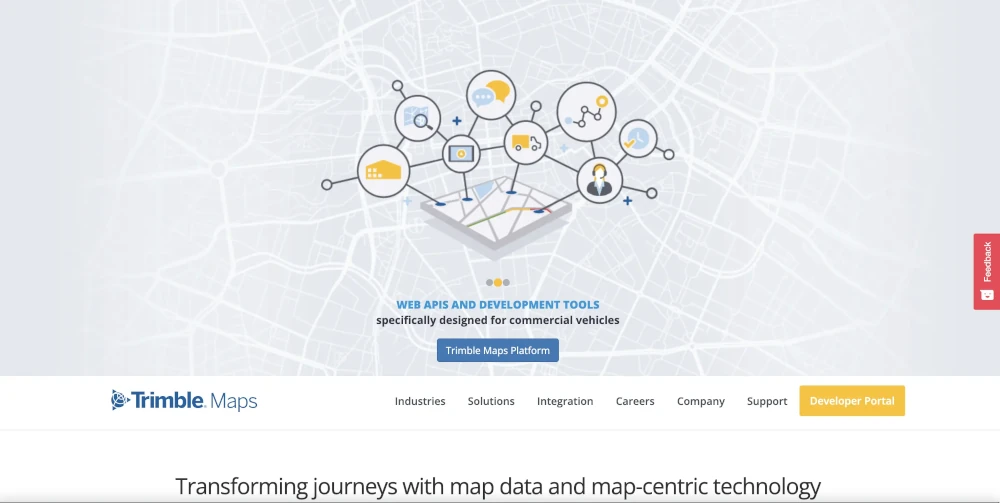
Small- and mid-sized businesses, particularly those with unusual use cases and workflows
4.5/5
Trimble Maps is a feature-packed platform that offers a lot of functionality to deal with complex transportation operations. On the flip side, all of that functionality makes it quite complicated to use. The UI can be a little confusing, and the platform’s user-friendliness issues are exacerbated by a lack of comprehensive technical documentation. On the positive side of things, one of the biggest advantages of using Trimble Maps is adaptability. The company has shown willingness in the past to work with customers on adapting the product’s implementation to meet the needs of non-standard use cases or workflows. If your operation falls into that category of unusual workflows, Trimble Maps is certainly worth considering.
Pricing information is not publicly available; please reach out to Trimble for quotes.
✅ Adaptability: Trimble Maps is highly adaptable, with a demonstrated willingness to work with customers to tailor the product for non-standard use cases and workflows.
✅ Feature-Rich: The platform offers extensive functionality, including what-if scenario analysis, live weather and traffic information, real-time tracking, and truck-specific routing profiles.
✅ Real-Time Tracking and Notifications: Provides robust real-time tracking and notification features, enhancing operational efficiency and visibility.
❌ Complexity: The extensive functionality makes the platform quite complicated to use, with a potentially steep learning curve.
❌ Confusing UI: Users have reported that the user interface can be confusing, impacting overall user experience and efficiency.
❌ Lack of Comprehensive Documentation: The platform’s user-friendliness issues are compounded by insufficient technical documentation, making it harder for users to fully leverage its capabilities.
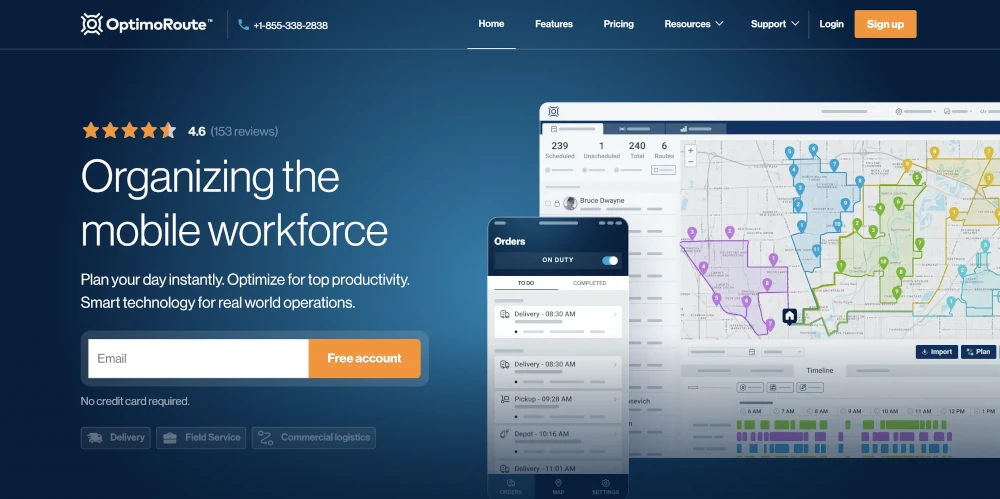
Best suited for field service operations
4.8/5
OptimoRoute offers a range of constraints and customizations to help you configure routes to match your business needs. You can define preferred service areas, technician skills, shift timings, vehicle capacities and capabilities, driver and vehicle costs, and more. Such control comes at the cost of simplicity and ease of use, though — the platform takes some learning and getting used to. While the optimization engine works quickly to generate routes, the results can sometimes be less than ideal. There’s often significant overlap between separate routes, and editing routes can be challenging.
OptimoRoute offers three pricing tiers: Lite, Pro and Custom. On an annual subscription, the Lite tier, with the bare essential features, will cost you $35.10 per driver per month. The Pro tier, which includes features like analytics and live tracking, costs $44.10 per driver per month on an annual subscription. To access more advanced features like multi-day long-haul routes, commercial routing and expert support, you’ll need to opt for the Custom tier.
✅ Ease of Use: OptimoRoute is user-friendly, making it accessible even for those without extensive technical expertise.
✅ Features: The platform offers a robust set of features that cover a wide range of routing and logistics needs.
✅ One-Stop Solution: OptimoRoute serves as a comprehensive solution for route planning and optimization, reducing the need for multiple tools.
❌ Setup Difficulties: Some users may experience challenges during the initial setup process, which can be time-consuming.
❌ Complex Interface: The interface can be complex and overwhelming for new users, potentially leading to a steeper learning curve.
❌ Connectivity Issues: There have been reports of occasional connectivity issues, which can disrupt workflow and efficiency.
Selecting the ideal route optimization API for your business involves evaluating several key considerations to ensure it meets your specific needs. Here are the main factors to keep in mind:
Consider whether the API can scale with your business as it grows. It’s crucial that the solution can handle an increasing number of routes and vehicles without compromising performance.
Look for an API that offers a high level of customization. This ensures that the solution can be tailored to fit the unique requirements of your business operations, whether that involves specific routing preferences or integration with existing systems.
Evaluate the quality of customer support provided by the API vendor. Responsive and knowledgeable support can make a significant difference in resolving issues quickly and maintaining smooth operations.
Analyze the pricing structure to determine if it fits within your budget. Consider both the upfront costs and any recurring fees. Look for transparent pricing models that offer good value for the features and performance provided.
The following table compares the APIs on the above-mentioned parameters.
Scalability | Customization | Support | Pricing | |
NextBillion.ai Route Optimization API | Highly scalable | Best customization capabilities | Premium and fast support | Flexible |
Google Route Optimization API | Average for large enterprises | Limited customization | Poor customer support | Fixed |
HERE Technologies | Average for large-scale trucking | Limited customization | Less responsive | Complex |
Routific | Not scalable for trucks | No customization | Moderate | Fixed |
GraphHopper | Good in Scalability | Customizable | Good | Credit Based Pricing |
FarEye | Good | Limited customization | Good | Information not available |
Route4me | Average | Limited customization | Good | Fixed |
Geoapify | Poor | Not available | Poor | Credit Based Pricing |
Trimble Maps | Average | Good | Good | Information not available |
OptimoRoute | Good | Good | Average | Fixed |
Joseph Jacob is a seasoned author with over 7 years of business writing experience behind him. After graduating as an aerospace engineer, he briefly dipped his toes into the world of sports journalism before finding his vocation in B2B SaaS content writing.